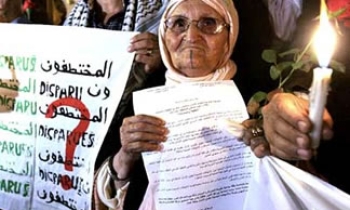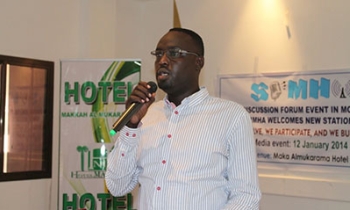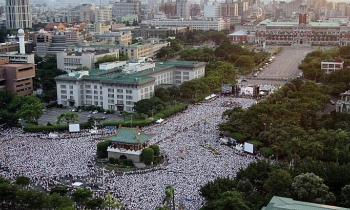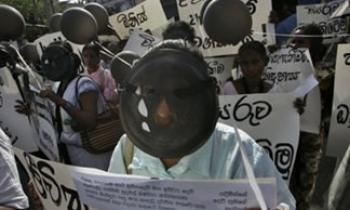Journalists from all over the world Thursday joined journalists in Iraq in their appeal for action to curb the violence against media staff which has claimed at least 130 lives in just three years. A statement from a global Committee for the Defence of Journalists in Iraq also highlighted a worldwide humanitarian appeal to help the media victims of violence.

The statement, supported by the International Federation of Journalists (IFJ), the Federation of Arab Journalists (FAJ), the Iraqi Syndicate of Journalists and the Kurdistan Syndicate of Journalists, both affiliated to IFJ, said, "Today, on the occasion of Iraqi National Press Day, more than 120 journalists' leaders and leaders of unions and association of journalists and media staff across the world are joining together to salute the courage of journalists and media staff in Iraq and to draw the world's attention to the media victims of a tragic conflict that has killed thousands with media staff among its targets."
"Since the invasion of Iraq in 2003 at least 130 reporters, broadcasters and media support staff have been killed, often in horrifying circumstances. It is an unprecedented level of suffering that has added to the atmosphere of fear and uncertainty and profoundly undermines efforts in favour of peace and democracy. At least 101 journalists and media staff from all regions of Iraq are among those killed. It is a catastrophe for press freedom on a scale not seen in any conflict in modern history," it said. Iraqi National Press Day dates back to 1869, to mark the date when the country's first newspaper, Al-Zawara, was launched in Baghdad.
Shihab Al Tamimy, President of the Iraqi Journalists Syndicate, said, "The working environment for Iraqi journalists has become extremely hostile to freedom of expression, to mobility, to daily life and to professional journalism. Acts of violence, murder and kidnappings are routine and increasing alarmingly. Journalists working in Iraq now lack the basic tools to do their work. The number of deaths is shocking – now well over one hundred – but we must not forget the hundreds of wounded or disabled colleagues whose families are really struggling to make ends meet."

IFJ General Secretary Adrian White said, "The continuing conflict in Iraq is a tragedy which is devastating and dividing communities through intolerable suffering and loss. This tragedy is deeply felt in journalism and within media. The Iraq conflict has cost the lives of more journalists and media staff than any other war in recent history. It is a catastrophe for press freedom which is vividly set out in this document. That is why, on the occasion of Iraq National journalists' Day, journalists and media leaders from around the world and from the Middle East and North Africa join hands to express their solidarity with the journalists of Iraq."
Al Tamimy welcomed "this remarkable display of solidarity and all donations and support from our colleagues in the international and journalistic communities. Bearing in mind the urgency of our situation, we renew our heartfelt thanks for your generosity and this pure gesture of humanity. We will never forget this."
White said, " Our appeal today is for action to end the suffering, for humanitarian support for the media victims of violence and, above all, to stand with our Iraqi colleagues and to assure them that they are not alone. The crisis facing journalists in Iraq touches all of us and we pledge to work together to bring an urgent end to their continuing ordeal."
On the shocking number of killings, White, during the announcement of the Global Solodarity Day, had remarked, that while some media were able to pull their people out of the country to reduce the risks, leaving was not an option for Iraqis or for major media. Foreign media reporting in Iraq relied heavily upon Iraqi journalists to provide the vital information, film footage and editorial material that make up much of the world's daily media coverage of the war.
Some facts being highlighted by IFJ are:
- The war in Iraq is the deadliest conflict for journalists in modern history. More journalists have died covering the war in Iraq than in any war over the last 100 years. One hundred and twentynine journalists and media staff have been killed since the invasion.
- Militant extremists are responsible for the vast majority of media killings in which many journalists have been deliberately targeted. There is worrying evidence that democratic forces have not done enough to explain media deaths that they were involved in.
- The majority of journalists killed in Iraq are Iraqis working for local media. They are not random victims. There is targeting of individual reporters and media, sometime accused of "collaboration" because of their independent reporting. Ninetynine Iraqi journalists have been killed.

"Most of the killings have been at the hands of insurgents, none of whom are bound by any civilised values or respect for human rights," said White, according to a Reuters report. "But, worryingly, around 20 of the media victims died at the hands of coalition, mainly US, forces. We're still demanding that the US military carry out independent inquiries into how our colleagues died."
The IFJ official went on to lament that "the scale of the killing hasn't been fully recognised, even by the UN". White added: "A clear, emphatic and unambiguous statement from the UN Security Council or the UN General Assembly condemning this state of affairs would be a good start – but we're still waiting."
Iraqi Journalists Association (IJA) deputy head Dawood al-Janabi also voiced concern about a pattern of restrictions on press freedom set by government officials, political parties and multinational forces. At a press conference Wednesday, Prime Minister Nouri al-Maliki threatened to impose emergency laws on the media should they criticise his official security plan or "offend Iraqi sensibilities". Rather, al-Maliki urged the media to be "positive and cooperative with the state". Al-Janabi criticised the prime minister's position. "We're against the arrest and prosecution of journalists... they should be free to express their opinions," he said.









